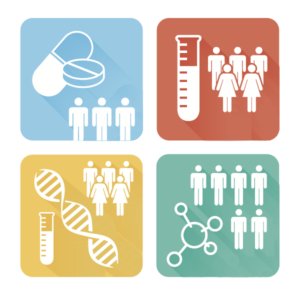Insights into Clinical Research: Effective Strategies for Study Participant Recruitment & Retention

In the world of clinical research, accelerated drug development can be a tedious process, taking over 10 years for medications to get to market. From bench to bedside, pharmaceutical companies invest millions of dollars, and delays in drug development cost thousands of dollars per day. This is where key insights into Recruitment and retention can help aid in accelerated drug development.
BioPharma Services takes pride in being a one-stop-shop solution for all sponsor needs from medical writing, PK analysis, clinical trial data management and of course their very own in-house recruitment department. We asked these key industry leaders questions related to recruitment, retention, marketing and outreach and here is what they had to say!
1. Can you tell us about your educational and professional background in research?
I have a Bachelor of Science from the University of Waterloo (Go Warriors!) and I am currently an EMBA candidate. I have over 8 years of experience in Clinical research, primarily in Phase 1 and late phase clinical research, with a special focus on Endocrinology and metabolic diseases.
2. Can you walk us through a recent research project you worked on and what your role was in the project?
I was very excited to find out that BioPharma was awarded with a study looking at participants living with Type 2 diabetes! As the Senior Manager of participant recruitment and retention, I was involved in strategizing and overseeing the recruitment and screening process of study participants.
This is the first of its kind at BioPharma Services, and the start of many more as we take on more Phase 1 clinical research requiring unique and diverse populations. We continue to push the boundaries of what we can do, not only from a recruitment standpoint but also a clinical operation standpoint, to meet our future Phase 1 business needs.
3. How do you stay current with the latest developments and advancements in your field of research?
I stay connected via LinkedIn, there are a lot of conferences and expo’s that I am asked to speak at or attend. I love meeting people face to face and picking their brain.
4. Can you give an example of how you’ve successfully navigated a challenge in study participant recruitment?
There are many ways to navigate challenges in recruitment of study participants; I always say you’re only as good as your database, the strength of your database can tell you if you need to deploy other tactics in conjunction. Marketing is a great tool to build your database and vet future study participants; based on the population needed and budgets allocated, it’s a quick short term solution, or can be a strategic long term solution-here at BioPharma Services we use marketing initiatives heavily for both short term and long term needs.
It’s always good to have a physician network in your back pocket to help aid in recruitment. Forming relationships with clinic networks or physician networks allows for three main benefits; access to tools like EMR’s and medical staff to aid in pre-screening of future study participants regardless of therapeutic area, given that physicians see a wide variety of patients, from healthy to unique disease areas.
Physicians are able to educate their own patients about a specific study and educate patients on what the clinical research process entails. Lastly, they provide additional real estate for advertising material, its added exposure and visibility of the study, may this be for flyers or sign up sheets.
5. How do you approach recruiting study participants for clinical research?
Given my background in the patient population, I would say my approach is very “Patient centric”, or “Participant centric”. Our study participants are our clients! They have a lot of knowledge in clinical research and are eager to share their insights and feedback. Our participant Engagement team works very closely with veteran participants to better understand the needs of our New participants.
We focus on the study participant’s experience, from the first phone call to the last return visit. Start to finish it needs to be not only a great experience but a meaningful one. Being a study participant means being a medical hero, they’re contributing to innovation and drug development on a regular basis.
6. Can you discuss your experience with outreach and marketing strategies for clinical research?
Community engagement or outreach is one of the keys that can unlock a door of opportunities. It provides exposure of our business and visibility to our studies. We can educate the public about what study participation entails, debunk a lot of misconceptions, and highlight our referral program even if they themselves don’t qualify. We have onsite recruiters ready to answer any questions and if they’re shy to talk to one of us, they can always scan our QR code to register.
BioPharma Services has always been an industry leader in being able to handle a large volume of bioequivalence studies; given that this requires healthy participants, we used digital advertising heavily to keep up with the demand and to of course grow our database. Now that BioPharma Services is slowly pivoting from our typical heavy volume of Bioequivalence studies, we changed our marketing strategy to ensure we keep up with the demands of a diverse and unique study populations.
For example our St. Louis Missouri site had a challenge in attracting Recreational Opioid users for a study, due to the privacy and sensitive nature of recreational opioid use, we built a HIPAA-compliant pre-screener on our website that study participants have the option of taking. This pre-screened really emphasized privacy of submissions and information storage, this provided study participants with an anonymous platform to speak of recreational opioid use, frequency and if interested prompted them to register for the study.
We noticed a higher conversion rate for participants that took the pre-screener as compared to others, simply because they had a better understanding of the study and what it entails. This is just a minor example of how BioPharma pivots and changes marketing strategies to not only cater to study participants, but to also keep up with business needs.
You can learn more about BioPharma Services’ Renowned Human Abuse Potential (HAP) study experience Here.
7. Can you walk us through your screening and enrollment process for clinical research participants?
Once a potential study participant is vetted for eligibility by one of our Recruitment specialists for any given study, they are provided with an email which not only goes over study details but also highlights information on the time, date and location of their upcoming screening appointment. They arrive at the clinic where they are greeted by our friendly staff to start the screening journey; we go over the informed consent to ensure participants are informed of all aspects of the study before proceeding to the next step, we further confirm eligibility by going over medical history.
Once eligibility is confirmed, vitals are collected and blood work is completed, blood sample collection is a very important step as it can indicate underlying conditions that most people may not even be aware of, this is almost like a medical check up. Lastly, their visit is concluded with a physical exam from our physician also known as a principal investigator. Based on the test conducted and turn around time of lab work, it takes a few days for us to receive results. Our principal investigator reviews the lab for any abnormalities and assess their safety, they may request repeat labs to reconfirm.
If a study participant is deemed eligible to proceed by our principal investigator, study participants are called to be informed of eligibility and informed to come in for check in of the study. Based on the nature of the study Bioequivalence vs Phase 1 Clinical Trials, study participant numbers are assigned not only to the primary group but also a subset of standby participants.
Study participant numbers simply dictate the order in which other clinical activities take place, such as dosing and blood draws. Phase 1 studies use a lottery system, while most Bioequivalence studies simply proceed with participant numbers in their assigned order. During study conduct there is open communication about any issues encountered, safety assessments, etc., the operational team works to ensure everyone in the bigger picture has a pulse check on how each of the visits are going.
Why Choose BioPharma Services?
BioPharma Services is an ideal choice for sponsors looking for a one-stop solution to their clinical research needs. BioPharma Services offers an in-house recruitment department that provides personalized attention to study participants, ensuring their experiences are not only great but also meaningful. BioPharma Services’ approach to outreach and marketing strategies ensures exposure of their business, educates the public about clinical research, and debunks any misconceptions.
Choosing BioPharma Services guarantees accelerated drug development, which saves sponsors time and money. This is just a small insight into BioPharma Service’s ongoing success story. It is very evident that their team not only understands the needs of participants, but also works with them to ensure a meaningful clinical trial journey.
BioPharma Services, Inc., a Think Research Corporation and clinical trial services company, is a full-service Contract Clinical Research Organization (CRO) based in Toronto, Canada, specializing in Phase 1 clinical trials 1/2a and Bioequivalence clinical trials for international pharmaceutical companies worldwide. BioPharma has clinical facilities both in the USA and Canada with access to healthy volunteers and special populations.



